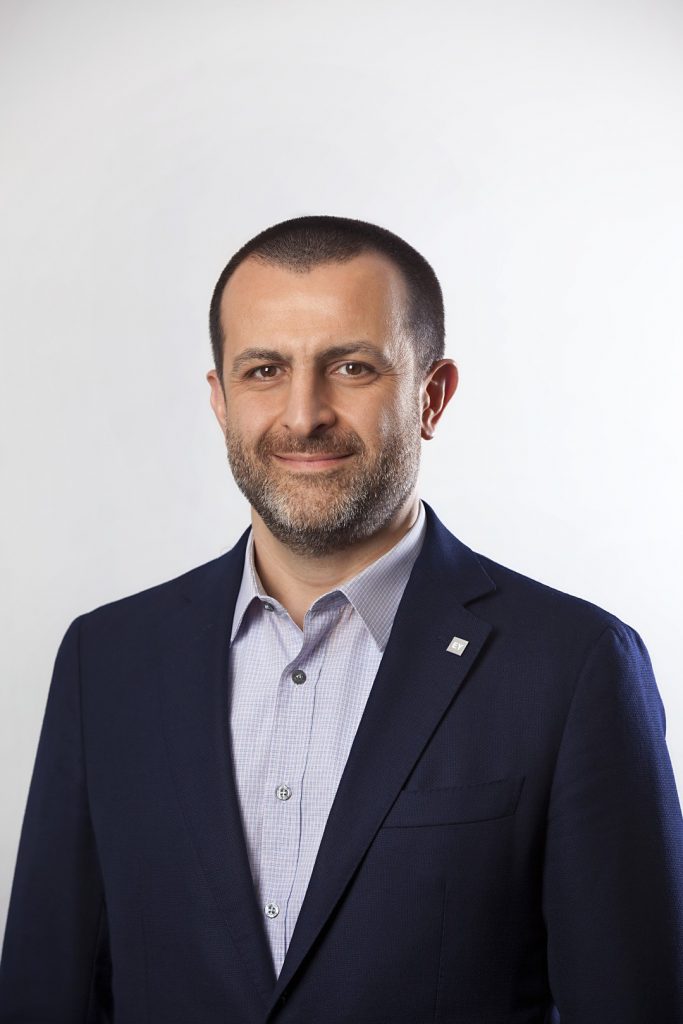Progress of the private sector towards Sustainable Development Goals
EY Georgia primarily engages in consultancy services, encompassing legal and tax advisory. The company articulates its mission as striving to forge a more conducive working world. A favourable working environment, according to EY Georgia, is one characterized by the sustainable and inclusive economic growth.
The multidisciplinary teams at EY Georgia are consistently dedicated to enhancing the overall quality of the company’s services. They leverage their collective knowledge, skills, and experience to improve the service quality aligned with their commitment to positive change.
EY, commissioned by the UN Global Compact Georgia Network, undertook a comprehensive study evaluating the private sector’s advancements in implementing the SDG Agenda from 2015 to the present. This research spanned across the globe, including Georgia. Notably, this initiative marked the inaugural assessment in Georgia dedicated to gauging the private sector’s contribution and progress. The findings of the research reveal that Georgia holds the 42nd position among 166 countries in terms of the performance of SDGs.
As per the research findings, the private sector emphasizes the importance of launching a national awareness campaign on sustainable development goals, targeting not only the private enterprises but also the general public. Additionally, the study uncovered a significant gap, indicating that sustainable development goals are infrequently integrated into the strategies and policies of the companies operating in Georgia. Moreover, the primary request from the private sector, identified through the research, underscores the need of government involvement and assistance as the top priority.

Ruslan Khoroshvili, the Managing Partner of EY Georgia, and Nino Esakia, the Government and Public Sector Leader at EY Georgia, share their insights on the research.

In light of the survey results, as a leading consulting company and a member of the UN Global Compact, how would you assess the progress in implementing the 2030 Agenda?
The global community has set ambitious goals to achieve by 2030, and with half of the allotted time already elapsed, it provides an opportunity to evaluate the progress achieved. In this research, in addition to Georgia we collected the data of other countries worldwide. We are proud to say that the research, reveals that we, as a country, surpass many others, including the developed nations, in meeting certain goals. Globally, Georgia holds the 42nd position out of 166 countries. The country has already achieved the implementation of the SDG 4 and has positive strides in SDG 1 (No Poverty), SDG 6 (Clean Water and Sanitation), SDG 7 (Affordable and Clean Energy), and SDG 13 (Climate Action) implementation. However, the challenges persist for the remaining 12 goals, influenced by the factors like the COVID-19 pandemic and regional geopolitical dynamics.
It is evident that progress has encountered obstacles, with both the global community and Georgia losing momentum and achieving the 17 goals by 2030 now presents a more formidable challenge than before. Nevertheless, there remains a window of opportunity to unite efforts, share responsibility, and, in alignment with SDG 17, forge collaborations between the private and public sectors to collectively promote global prosperity.
Could you provide direct insights into the research process? What was the preparation process like, the primary objectives of the research, and the methodology employed? Furthermore, to what extent were various stakeholders engaged in this undertaking?
The SDG Stock Take Survey stands as a pioneering initiative, marking the first-ever assessment of the private sector’s contribution and progress in Georgia. We take pride in the fact that Georgia is a pioneer country, joining several Western nations in undertaking this research. The study aimed to evaluate the private sector’s advancements from 2015 to the present and identify the strategies to accelerate progress by 2030. Conducted through a quantitative approach, the research involved outreach to hundreds of leading companies spanning diverse sectors in the Georgian market. Additionally, in-depth interviews were held with numerous business leaders, including the prominent figures from the leading business associations, the Investors Council, the UN Global Compact Georgia Network, and the National Council for Sustainable Development Goals of the Government of Georgia. These stakeholders provided insights into their perspectives on SDGs, awareness levels, current practices at various organizational levels, challenges faced in achieving the goals, and their visions for enhancing private sector engagement. The major companies, particularly the members of the UN Global Compact Georgia Network, welcomed and actively participated in the study, expressing a desire for more such initiatives in the future. The research revealed that Georgia’s private sector is motivated to contribute to the goals but requires clear direction to effectively mobilize and maximize involvement. The assessment also offered a comprehensive overview of Georgia’s progress toward achieving the Sustainable Development Goals. It is evident that the private sector plays a pivotal role by contributing through its own initiatives.
What were the key findings of the study, and were there any particular results that captured your attention?
One of the most notable and, unfortunately, expected findings was the notably low level of awareness among private sector entities regarding the SDGs. While business leaders, in general, are informed about the SDGs, there was a significant lack of understanding about the essence of these goals. For instance, despite 57% of companies in the food industry claiming a high level of awareness of the SDGs, only 3% could correctly identify SDG 2 – No Hunger as relevant to their operations. Consequently, the integration of the SDGs into companies’ strategies and policies is infrequent, leading to a lack of measured progress. The private sector’s contribution to progress is often seen as the corporate responsibility of individual business leaders, and while some companies align their sustainable actions with specific goals, only a minority actively pursue such initiatives. Regarding the challenges, the primary obstacle identified is the insufficient information and communication about the SDGs within the private sector. A noteworthy challenge is also the lack of incentives, with companies perceiving limited financial benefits (beyond social impact) in engaging with the goals achievement. When asked about their priorities, the private sector identify the need for government involvement and assistance as the top priority.
When we asked the companies to identify the goals most relevant to them, the priorities for the Georgian private sector emerged as follows: SDG5, SDG8, and SDG4.
What would be the main achievement and challenge in the implementation of the Sustainable Development Goals by the private sector?
The primary achievement within Georgia’s private sector lies in the expressed willingness of the business leaders to actively participate in the process of achieving the goals. This eagerness demonstrated by the private sector was quite unexpected. Private sector is a significant resource, albeit one not fully utilized by the country. The main challenge centres around the lack of communication and partnership. The private sector advocates for the establishment of a robust public-private partnership. This collaboration would facilitate regular dialogues between the private sector and the government, fostering an environment in Georgia that encourages private businesses to actively contribute to the achievement of sustainable development goals.
How would you assess the outcomes of actions and initiatives undertaken by the private sector to attain sustainable development goals? Have you employed measurable indicators to gauge these results?
While it is recognized that each SDG is accompanied by specific indicators for measurement, it’s important to note that Georgia’s progress evaluations often overlook the private sector’s contribution, relying primarily on the data published by the public sector. Therefore, we tried to track and showcase the private sector’s progress since 2015. However, according to the private sector they lack the measurement guide essential for integrating its contributions into the broader assessment of the country’s progress.
Based on this research, what recommendations can you offer to the private sector, and how might the research findings influence future policies and actions to implement the 2030 Agenda?
The challenges identified by the private sector underscore six priority themes for policy actions and recommendations at the national level: awareness, skills development, public-private partnerships, access to finance, incentive tools, and the establishment of impact measurement guidelines.
Primarily, the private sector advocates for a nationwide awareness campaign addressing the Sustainable Development Goals, targeting not only businesses but also the general public. Additionally, recognizing a shortage of qualified personnel in the country, the private sector calls for government support in implementing the educational training programs to enhance sustainable and green skills.
In terms of collaboration, individual efforts from both the private and public sectors are deemed insufficient, there is the need for establishing a sustainable platform for public-private partnerships, ensuring the active engagement of the private sector in practical initiatives. It is necessary to involve the private sector in the policymaking process, consider their perspectives, and leverage innovations for more effective collaboration.
Simultaneously, the private sector emphasizes the significance of overcoming barriers to access finance. To incentivize businesses, the government could provide grants or implement soft credit/guarantee schemes for the enterprises engaging in sustainability activities. Financial institutions can contribute by offering low-cost loans to sustainable companies, while businesses themselves can issue green or sustainable bonds to attract investors supportive of sustainability initiatives.
Moreover, the importance of having effective incentive tools was underscored. Efforts toward achieving sustainable development goals should be not only compelling but also financially rewarding for the private sector. The government can play a role by introducing preferential taxes, implementing incentive procurement policies, and raising consumer awareness to bolster demand for sustainable products and companies.
Finally, a critical challenge hindering the private sector in achieving the Sustainable Development Goals is the absence of impact measurement guidelines. To address this, there is a need to develop a comprehensive methodology or framework at the national level to guide businesses on measuring their sustainability impact. The government can support the private sector with capacity-building training and resources to integrate best practices in sustainability measurement. Furthermore, it is quite feasible to integrate sustainability data into mandatory annual statistical reporting.




 Search
Search





